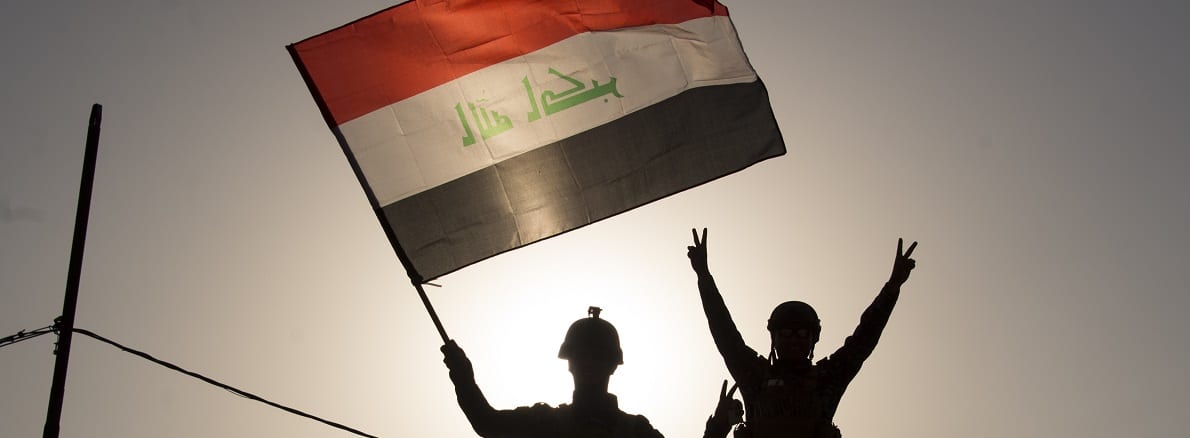Led by the United States and aimed at overthrowing Saddam Hussein’s regime, March 20th, 2003 marked the start of the invasion of Iraq. The decision to lead an attack against Baghdad had been reached in 1991 after the Gulf War and the liberation of Kuwait, but it was only in 2001, after 9/11, that, in the name of the Global War on Terrorism, it became easy for the U.S. government to obtain public support for a new war.
In 2002, U.S. President George W. Bush accused Saddam Hussein of supporting “terrorist groups”, including al-Qaeda, and announced his intention to uncover the “infamous” weapons of mass destruction manufactured and stored in Iraq. On November 8th, the United Nations Security Council adopted Resolution no.1441 in order to readmit inspectors to Iraq and embark on a disarmament process. The country appeared to comply with the resolution, but that was not enough for U.S. and Great Britain, countries that decided to send Saddam an ultimatum demanding he leave Iraq within 48 hours. This marked the end of diplomacy and the beginning of the war. France, Germany and Russia refused to take part in the attack, but the United States launched the operation nonetheless.
Large numbers of Iraqi troops chose not to resist the advance of the Coalition’s forces. On April 9th the weak resistance also collapsed in Baghdad and U.S. Army took control of the city. Over a few days, Special Forces occupied Kirkuk, Mosul and Tikrit, Saddam’s hometown. Saddam Hussein was captured on December 13th and executed on December 30th, 2006.
The destruction of Iraq’s weapons of mass destruction was the main justification for this military operation, but after the invasion, the Iraq Survey Group, an international team of investigators, concluded that the country had abandoned its nuclear, biological and chemical weapons programmes following defeat in the 1991 Gulf War.
Following the collapse of the Ba’athist regime, Iraq became enveloped in an escalation of sectarian violence. The Americans underestimated the effects of the war and overestimated their ability to export democracy. Firstly, the Iraqi economy was largely privatized and many people lost their salaries; no one had the skills required to take part in the new liberalization process and it was thus that only foreign investors took advantage of it. Moreover, the Iraqi Army was disbanded and more than one million former soldiers and security officers lost their jobs, while many weapons remained in circulation.
The most serious mistake, however, was the “de-Baathification” process, involving the exclusion and prosecution of thousands of individuals on the basis of their rank within the Baath party and its hierarchy. In particular, this method damaged the Sunnis, and facilitated the rise of al-Qaeda and Abu Mussab al-Zarqawi’s jihadism creating a senseless short circuit
Elections for the National Assembly were held on January 30th, 2005 in order to draft a new constitution for Iraq. The United Iraqi Alliance, backed by Shia Grand Ayatollah Ali al-Sistani, led with 48% of the votes, followed by Democratic Patriotic Alliance of Kurdistan with 26%. The Sunnis boycotted the vote, while more than one hundred attacks on polling stations were carried out across the country, especially in Baghdad.
Following the ratification of the constitution, a general election was held on December 15th to elect the Iraqi Council of Representatives. The United Iraqi Alliance won 128 seats, the Patriotic Alliance of Kurdistan 53 seats, the Iraqi Accord Front, a Sunni political coalition, 44 seats. Seats within each governorate were allocated through a proportional system, to give more weight to Arab Sunni voters.
A government of national unity was created in 2006, but violence and sectarian conflict between Sunnis and Shiites did not come to an end. In November 2008, the Iraqi Parliament reached an agreement with the U.S. aimed at redefining military activity in Iraq and setting a timetable for the final withdrawal of U.S. forces before the end of 2011. The Iraqi people voted again in 2010 (parliamentary elections) and 2013 (provincial council elections). In 2013, a group named ISIS, Islamic State of Iraq, created in 2006, announced its integration with an al-Qaeda backed militant group in Syria, which in 2014 took control of Falluja, Mosul and Tikrit and on June 29th ISIS announced the creation of a caliphate.
Since 2014, ISIS has perpetrated human rights abuses and war crimes, including the use of child soldiers. According to Human Rights Watch, in territories controlled by ISIS in 2017, those fighters continued to resort to torture, murder and sexual violence so as to maintain their power. During the battles against anti-ISIS forces, the group has carried out chemical attacks and used civilians as human shields.
The recapture of Mosul and the end of the caliphate did not, however, put an end to violence. On September 25th, despite opposition from Baghdad, the Kurdistan Regional Government held a referendum on independence in Kurdish areas as well as in disputed territories de facto under KRG control. On October 16th, Iraqi Hashd al-Shaabi Shiite militias launched a new offensive against Peshmerga forces to retake most of the contested territory, such as Kirkuk and Shangal (Sinjar).
While amidst sectarianism, political and economical interests, yet another frail balance exists between the central and regional governments concerning borders and resources, Iraq is preparing for elections on May 12th. Abadi’s challengers are former Prime Minister Nuri al-Maliki and former Transport Minister Hadi al-Amiri, both very close allies of Iran. Whatever the outcome, the cards have been dealt.
AFP PHOTO / FADEL SENNA


